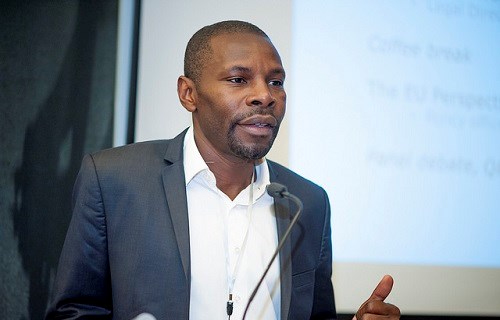Existing transfer system is riddled with problems

Jean-Claude Mbvoumin, founder of FootSolidaire. Photo: Thomas Søndergaard/Play the Game
28.10.2015
By Juliana BarbassaThe failure of professional sport transfer systems to adequately protect players, particularly minors, from an exploitative environment was discussed on the fourth day of Play the Game 2015. During the robust debate that followed, the solutions explored ranged as far as the outright abolishment of the transfer system.
This discussion is taking place at a time when the most powerful sports federation, FIFA, which has overarching responsibility for the 3 billion euro a year player transfer system, is facing a crisis of credibility and legal scrutiny for allegations of corruption.
The chair, Sine Agergaard from Aarhus University in Denmark, opened the debate about the transfer system by laying out the specific context within which it is situated, which includes this “dubious sporting industry”.
Transfer or trafficking
Participants then tackled the central question of whether, and to what degree, the player transfer system can be likened to trafficking, what are the ways in which existing policies and regulations fail, and what can various sectors – policy makers, sports governing bodies, human and civil rights organisations – do to improve conditions.
The first panelist was Niko Besnier, professor of cultural anthropology at the University of Amsterdam and principal investigator of the European Research Council’s project Global Sport. He strove to bring nuance to the question by drawing from his research into rugby recruits from the Pacific Islands, where sports migrants are connected to extensive kinship networks through ties of interdependence and reciprocity.
Often, the decision to place their lives and careers in the hands of someone who an outsider might view as a trafficker is a calculated decision move not only by the player himself, but by that network, which weighs the potential benefits against the dangers.
He urged clubs, teams and policy makers to take these relationships into consideration as potential tools for improving careers and life trajectories.
“Concrete action is overdue”
To the second panelist, Jean-Claude Mbvoumin, founder of the Association Internationale FootSolidaire, the matter of player protection within a system in which he is the most vulnerable and disempowered link was urgent and concrete action long overdue.
He was faced with this reality when he landed in France as a young recruit from Cameroon, and encountered in the streets other players who often came from unregulated academies in Africa into the hands of unscrupulous intermediaries and who found their dreams of playing soccer for the big leagues end in penury, leaving them without recourse.
The problem stretches from weak, unenforced regulation, a lack of information for families and the players themselves, and an institutional framework that often still denies that a problem exists.
For the sake of the future of the game, he said, it is essential that this be addressed.
“We cannot continue to watch football on TV while thousands of youngsters are ending up on the streets,” he concluded. “We need your help.”
He was followed by Emanuel Macedo de Medeiros, president of ICSS. He spoke about the need for greater transparency of the financial flows behind player transfers, and gave examples of three young men who had moved across continents following promises of opportunities in soccer or basketball only to find themselves stranded.
“Trafficking of young players is a business, that has gained deep roots facilitated by permissive environment,” he said. “But it is a crime and must be punished as such.”
Abolish the transfer system?
Wil van Megen, the legal director of players’ union FIFPro, tore into the current transfer system as one that is protective of elite teams and abusive of players. The problems include late payments for athletes, limits on their movement, the lack of labor law protection, the trafficking of minors, poor oversight of rules that say intermediaries should not charge fees and “alternative money flows”, he said.
Earlier this year FIFPro lodged a legal complaint with the European Union against FIFA hoping to overhaul the transfer mechanism.
Their conclusion, van Megen said, was that the system is so broken it must be abolished.
The last presenter was Zenon Severis, a policy officer of the European Union’s sports unit who spoke about what they have done to describe best practices and work toward protecting the game and its integrity.
Among other measures, he named an extensive study from 2009, which found extensive failures around the regulation of agents. It was presented to FIFA, which took some time but implemented changes, he said.
“We are giving it time to see if it will work,” he said.
Meanwhile, they are gathering experts and observers in a group that, starting in January, will begin to develop recommendations for good governance and the protection of young athletes and children in sport.
What was clear from the discussion is that the existing transfer system is riddled with problems, many of which are not completely understood or fully described. According to moderator Agergaard, Wednesday’s panel showed “we need to know more – we need more journalism and researchers and policy officers and NGOs working in this field.“





